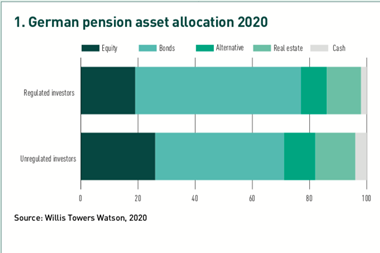A proposal to reform Germany’s first pillar pension system, summed up in a report by the Scientific Advisory Board at the Federal Ministry for Economic Affairs and Energy, is causing intense discussions in the country, culminating in pushbacks.
In the report, the board tried to solve the dilemma on how to secure a certain standard of life in old-age while guaranteeing financial sustainability to the pay-as-you go system.
It recommended avoiding extending the double backstop, or Haltelinie, after 2025. The measure, approved as part of the Pension Pact 2019, secures a level of pensions of at least 48% of wages and limits the contribution rate to a maximum of 20%.
This, and similar measures, could only be financed at costs of additional expenses to the federal budget, the report added.
The board also touched on the reintroduction of the so-called catch-up factor, or Nachholfaktor, a mechanism leading to automatically adjust pensions to the level of wages, which was put on hold by the government until 2025.
The formula protects pensions from falling, but also from rising above a certain level in case wages increase. The advisory board noted the reintroduction of the catch-up factor before 2025 would restore a balance between pension pay-outs and contributions.
The proposal causing the strongest pushbacks was, however, the increase in retirement age to 68 in 2042, in line with projections on life expectancy.
The board also recommended replacing a flat retirement age with a more flexible “retirement window”, to give freedom of choice on when to retire.
Deductions or premiums for people choosing their retirement age must be raised to the “actuarially neutral level”, and employees should have the opportunity to continue working during the retirement window, the report added.
Current rules foresee the retirement age gradually increasing to 67 until 2030, although an option to retire at 63 for long-time insured people has also been introduced.
No reform now
The report was published at an unfortunate time, with political parties engaged in a campaign to win the general elections in September, unwilling to talk about a delicate issue such as the reform of the pension system.
The minister for economic affairs, Peter Altmaier, said on Twitter: “The retirement age has been set at 67 years in the first Grand Coalition (CDU/SPD/CSU) [and] it should remain unchanged – that has been my opinion for years.”
Altmaier added that the Scientific Advisory Board, which operates under his ministry, is an independent body whose proposals do not represent an obligation for the ministers.
The Chancellor candidate for the Social Democratic Party (SPD) and finance minister Olaf Scholz took to the social network as well to note that the increase of the retirement age is not part of the programme of the social democrats.
“Our goal is a fair pension system based on solidarity. I look forward to a debate with real experts!” he added.
“We reject [the proposal] to postpone the retirement age,” said Alexander Dobrindt, leader of the Christian Social Union (CSU) group.
The co-head of Die Linke party, Susanne Henning-Wellsow, called the proposal “anti-social”. Katrin Göring-Eckardt, the leader of the Greens’ parliamentary group, named it “unimaginative”.












